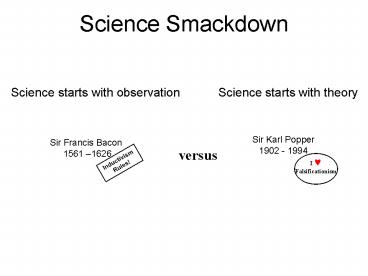Science Smackdown - PowerPoint PPT Presentation
1 / 14
Title:
Science Smackdown
Description:
Science Smackdown. Sir Francis Bacon. 1561 1626. versus. Science starts with theory ... The theoretical or empirical question which motivates the research. ... – PowerPoint PPT presentation
Number of Views:24
Avg rating:3.0/5.0
Title: Science Smackdown
1
Science Smackdown
Science starts with theory
Science starts with observation
Sir Karl Popper 1902 - 1994
Sir Francis Bacon 1561 1626
versus
Inductivism Rules!
I ? Falsificationism
2
Falsificationism
Scientific Method
Hypothesis
Sir Karl Popper 1902 - 1994
Prediction
Falsified
Conduct Test
New test needed
Hypothesis Testing
3
Hypothesis Testing
Question The theoretical or empirical question
which motivates the research. Alternative
Theories The possible alternative theories that
provide explanations to the question.
Logic If X -gt Then Y specific predictions
Method Description of the procedure and
stimuli used in the experiment Results Descripti
on of the relevant data that was
obtained Inferences Which alternative(s) were
or were not supported by the experimental
results
4
Question Are in-vehicle navigation systems
useful?
Problem statement Do drivers utilize traffic
information provided by in-vehicle navigation
systems to aid in driving?
Kantowitz, B.H., Hanowski, R.J. Kantowitz, S.C.
(1997). Driver acceptance of unreliable traffic
information in familiar and unfamiliar settings.
Human Factors, 39, 164-176.
5
Multiple Hypotheses
Hypothesis I Drivers use all available
information to optimize their driving
performance.
Hypothesis II Drivers prefer to rely on memory
to optimize their driving performance.
6
Logic
Hypothesis I Drivers use all available
information to optimize their driving
performance. Logic If drivers user all
available information, drivers will be benefited
by in-vehicle navigation aids when accurate and
available. Inaccurate information should be
detrimental to driving performance.
Hypothesis II Drivers prefer to rely on memory
to optimize their driving performance.
7
Logic
Hypothesis I Drivers use all available
information to optimize their driving
performance. Logic If drivers user all
available information, drivers will be benefited
by in-vehicle navigation aids when accurate and
available. Inaccurate information should be
detrimental to driving performance.
Hypothesis II Drivers prefer to rely on memory
to optimize their driving performance. Logic If
drivers prefer to rely on their memory, when the
driver is familiar with the driving area,
navigation aids will not be used, even when
accurate and useful navigation aids are
available. If the driver is unfamiliar with the
area, navigation aids will be used.
8
Methods - Participants
48 participants 24 males and 24
females Participation requirements had a
driver's license were familiar with driving in
the Seattle area drove at least twice per
week. Age range 18 to 35 years Mean years
lived in Seattle 10.8 Mean years driven in
Seattle 4.8 Mean miles driven annually 9,219
9
Methods - Equipment
Battelle Route Guidance Simulator Simulated
traffic video Simulated traffic data
10
Methods - Procedure
Must select route through city to avoid
traffic Can use in-vehicle navigational system
to request traffic information Participants
navigated four different routes in
total Participants start with a 15 pay
bonus Taking routes with traffic leads to a
payment penalty More traffic Greater
Penalty Less Pay
11
Experimental Design
Information Reliability Accurate
Inaccurate
Familiar
City
Within-Subjects
Within-Subjects
Unfamiliar
12
Results
Drivers familiar with the city layout do not
optimally use navigation aids
13
Inferences
Hypotheses Drivers use all available
information to optimize their driving
performance Drivers prefer to rely on memory
to optimize their driving performance
?
?
14
Science Smackdown
Usability
Science starts with theory
Science starts with observation
Sir Karl Popper 1902 - 1994
Sir Francis Bacon 1561 1626
versus
Inductivism Rules!
I ? Falsificationism































